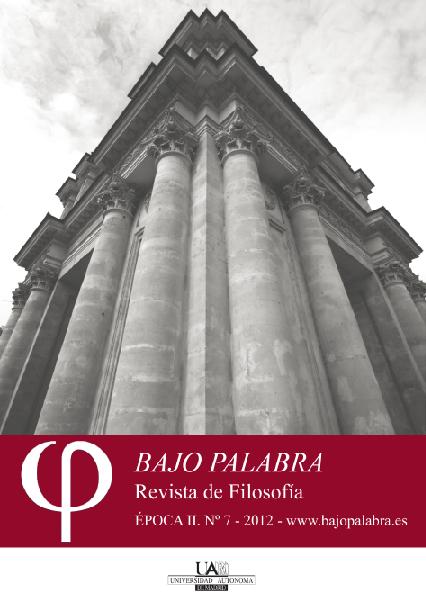Parole chiave:
humanismo, hombre, antropología filosóficaCopyright (c) 2012 J. Lizaola

TQuesto lavoro è fornito con la licenza Creative Commons Attribuzione 4.0 Internazionale.
Abstract
Las preocupaciones culturales y educativas de Samuel Ramos están íntimamente relacionadas con una propuesta filosófica más amplia. En ella contempla, fundamentalmente, la necesidad de realizar una antropología filosófica que nos aproxime a la indispensable reflexión sobre el hombre contemporáneo y especialmente sobre el mexicano. ¿Qué idea de hombre existe, fundamenta, sostiene, el actuar en específico del mexicano? Su respuesta se dirige a considerar que el alma del pueblo mexicano posee, por sobre cualquier otra distinción, el rostro del sufrimiento y la humillación, los cuales generan un sentimiento de inferioridad fortalecido por la larga serie de procesos dolorosos y traumáticos que han conformado su proceso histórico. Esta interpretación del mexicano como un ser paralizado e impotente, le permite elaborar su propuesta de una antropología filosófica cercana a la sugerida por Max Scheler que parte de una pregunta decisiva: ¿cuál es el puesto del hombre en el cosmos? O dicho más propiamente: ¿cuál es el puesto del mexicano como ciudadano de una sociedad moderna? Su respuesta implica la necesidad de elaborar un sentido, una direccionalidad e intencionalidad que Ramos denomina Nuevo Humanismo. Este es el punto central, el identificar la estructura que sostendrá a este nuevo hombre consciente, a y la vez perdido, en el mundo contemporáneo.
Downloads
Riferimenti bibliografici
Ramos, S., Obras completas. Hacia un nuevo humanismo. Veinte años de educación en México. Historia de la filosofía en México. U.N.A.M., México, 1990.
.— El perfil del hombre y la cultura en México, México, Espasa-Calpe Mexicana, Colección Austral, 1972.
Rovira, C., “Samuel Ramos ante la condición humana”, en http://www.ensayistas.org/critica/generales/C-H/mexico/ramos.htm
